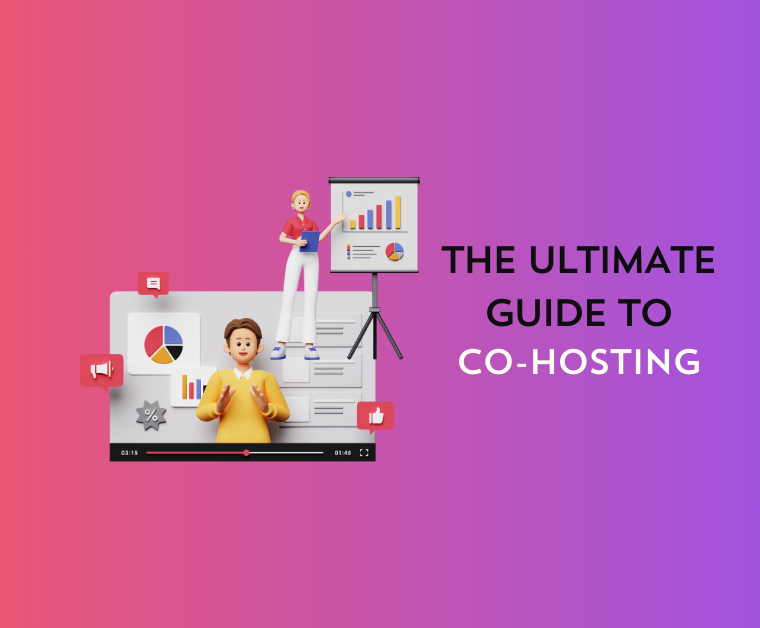Co-hosting has emerged as a pivotal strategy for event management and content creation, enhancing reach, diversifying content, and creating more impactful experiences. This comprehensive guide delves into the essence of co-hosting, providing practical advice, backed by statistics, for anyone looking to leverage this collaborative marketing partnership opportunity.
Contents
Understanding Co-Hosting
Co-hosting involves two or more individuals, groups, or organizations joining forces to plan, organize, and execute an event or series of events. It spans various formats, such as webinars, podcasts, workshops and conferences. The core objective is to combine strengths, resources, and audiences to create a more impactful and engaging event experience than what could be achieved solo.
According to a study by EventMB, collaborative events see a 35% increase in attendance compared to solo-hosted events.
The Benefits of Co-Hosting
1. Expanded Reach and Network
By teaming up with a co-host, you tap into their audience, potentially doubling your exposure. This cross-pollination of audiences is a cornerstone of co-hosting success. For instance, when two podcasters collaborate, their combined audiences create a new, larger pool of listeners. This expanded reach is not just about numbers; it's about tapping into a new demographic, which could be invaluable for brand growth and recognition. The cross-pollination of audiences is, without a doubt, a vital aspect of co-hosting success.
2. Shared Resources and Expertise
Collaborating with a co-host allows for a pooling of resources and expertise, leading to a more dynamic and well-rounded event or content piece. Each party brings its unique strengths to the table - be it in technology, content creation, marketing, or audience engagement. According to a HubSpot report, collaborations in content creation resulted in a 24% increase in content quality, illustrating the power of shared expertise . This synergy not only elevates the quality of the output but also can lead to more innovative and creative approaches.
3. Enhanced Learning Opportunities
When multiple experts collaborate, they bring a wealth of knowledge and diverse perspectives to the audience. This diversity enriches the content and can provide a more comprehensive learning experience. For example, in a co-hosted webinar on digital marketing, one host might bring expertise in SEO, while another excels in social media strategies. This variety ensures that the audience gains a holistic understanding of the subject matter, making the event more valuable and informative.
4. Increased Sponsorship Opportunities
Co-hosted events are often more attractive to sponsors due to their broader reach and diversified audience. This increased visibility can lead to more lucrative and numerous sponsorship opportunities. According to a survey by Bizzabo, events with multiple hosts secured 30% more sponsorship than those with a single host. This is a significant statistic for event organizers, as sponsorships are a crucial aspect of event funding and can greatly enhance the scale and quality of the event. The presence of multiple hosts can also give sponsors confidence in the event's potential for success and audience engagement.
Strategies for Successful Co-Hosting
Co-marketing is a versatile strategy suitable for various industries and sectors, but often with slightly different marketing goals. Co-marketing is popular with :
1. Choose the Right Partner
Selecting a compatible co-host is a critical first step. It's important to partner with someone who not only shares similar values and goals but also brings complementary skills and perspectives to the table. This diversity can lead to more creative and engaging content. Additionally, ensure that there's a good personal and professional rapport, as this will facilitate smoother collaboration and conflict resolution. Research potential partners thoroughly, looking into their past events, audience demographics, and content style to gauge compatibility.
2. Clearly Define Roles and Responsibilities
Clarity in roles and responsibilities is essential for a harmonious co-hosting relationship. It's advisable to have a detailed discussion early on to divide tasks such as content creation, marketing, technical setup, and audience engagement. Documenting these roles in a written agreement can be helpful. This division of labor should play to each co-host’s strengths, ensuring efficiency and preventing duplication of efforts. Regular meetings to track progress and reassess roles can also be beneficial.
3. Leverage Each Other's Networks
Utilizing the combined networks of both co-hosts can significantly broaden your event’s audience. This strategy involves more than just sharing information; it's about integrating your promotional efforts to create a unified message that appeals to both audiences. Utilize various channels like social media, email newsletters, blogs, or even cross-promotion on other events and platforms. The key is to ensure that the promotional content is tailored to resonate with both audiences while maintaining the unique voice of each co-host.
4. Focus on Content Quality
Quality content is the cornerstone of any successful event or collaboration. Work closely with your co-host to develop content that is not only informative and relevant but also engaging and interactive. This could involve brainstorming sessions, joint content creation days, or even hiring external experts to add more value. Regularly review and critique each other’s contributions to ensure that the content meets a high standard and aligns with the objectives of the event or collaboration.
5. Gather and Implement Feedback
Feedback is a valuable tool for growth and improvement. After the event or content release, gather feedback from both sets of audiences. This can be done through surveys, social media polls, or direct communication. Analyze this feedback to understand what worked well and what could be improved.
Best Practices in Co-Hosting
Case Study: Co-Hosting Success
A notable example of successful co-hosting is the collaboration between Forbes and LinkedIn for their webinar series on leadership and innovation. By combining their audiences and expertise, they not only saw a 40% increase in participant engagement but also expanded their respective networks substantially.
Co-hosting presents a world of opportunities for content creators and event organizers. Remember, the key lies in choosing the right partner, aligning your goals, and focusing on delivering quality content. Embrace co-hosting as a tool to expand your reach, diversify your content, and create more impactful experiences.


